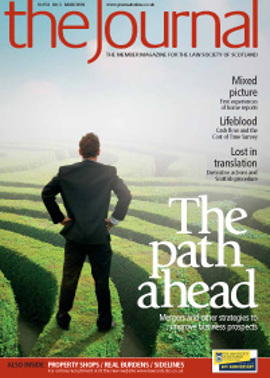We can work it out

Shortly before this issue went to press, the news broke that Dundas & Wilson, Scotland’s largest legal firm, was embarking on a redundancy programme that could affect up to 50 lawyers and support staff: proof, if proof were needed, that no one is immune from the effects of the current recession.
Although many firms have felt they have no alternative but to cut back on staff, various ideas have surfaced in recent weeks for initiatives that firms, and individual solicitors, can take to mitigate the threat of redundancies if a reduced volume of business demands that action be taken to cut staff overheads.
One large London firm recently formally offered its lawyers and support staff the option to work a four day week, with reduced salary, to try and reduce the number of job losses as it also launched a redundancy consultation. Others are looking at measures such as a salary freeze, reduced working hours or unpaid leave. At least two have been reported as considering asking associates to take periods of unpaid leave.
Some employees undergoing redundancy consultation have also been volunteering to take such steps as a way of protecting their jobs. Some lawyers still question whether part time working is consistent with proper client care, particularly in transactional work; but others point out that it is increasingly widely practised without causing major problems, particularly with a bit of flexibility on the solicitor’s part and gaining the client’s understanding by keeping them informed.
The Journal has also heard of one Scottish firm where the commercial property assistants all volunteered to cut their hours by half, if the firm agreed not to make any redundancies. Sharing out work in this way would have the benefit of keeping the team available to take advantage of any upturn in business – avoiding the mistakes of the last recession when firms were left chasing qualified lawyers to be able to take advantage of the upturn when it came.
Looking more broadly at alternatives, if you have ever wanted to take a sabbatical from work this might be the time to approach your employer. Equally they might be supportive if you have ambitions to spend some time in the developing world sharing your skills. Organisations such as Challenges Worldwide work with both individual volunteers and employers from the UK to match skills and expertise to the organisational development needs of partner organisations around the world: see Journal, March 2008, 28. Recently solicitor Dorothy Latimer and John Watt QC left on a two month initial scoping visit to Malawi, to work with various legal organisations there on a broader programme of support.
A lifestyle option?
As an alternative, could you be your own boss? Consultant Malcolm Mackay, interviewed for the feature on mergers with which this issue leads (p 10), also pointed out that technology makes it more possible now for someone made redundant to start their own practice with just a little capital.
“I’m dealing with several solicitors who have been made redundant, where it’s actually been the ideal opportunity for somebody to set up a new business, and the ones who have done it have found it quite a liberating experience. Many very good businesses have been started because somebody has been made redundant and thought, I’ve now got some capital to set up a business; this is my skillset; these are my clients; I don’t need big overheads; I can have a close relationship with my clients; it’s a good lifestyle.
“Again because of the way the economy’s going I think you’ll see more in the way of lifestyle lawyers. That’s not a positive or a negative statement: it’s just people saying, I don’t want necessarily to work very long hours and have a huge salary.”
While agreeing that it remains to be seen how many such enterprises the market can support, Mackay believes that increasingly there will be more opportunities for people with basic technology and a decent website, “because what that model takes out of the market is the unnecessary overheads. So clients will very often feel they are getting a good deal. And of course the ones with imagination can use the technology, the websites, in a way to build a business, so they can start on their own but then build a business in quite a different way. Firms built that way will look quite different from law firms that we see today.”
He concludes: “I suppose the bottom line, if you’re a lawyer and thinking about your future and what your law firm’s going to look like and so on, is that you create your own future. That’s how it’ll look.”
Over to you.
Society update
The Law Society of Scotland website has a page for those looking for information about re-employment: see www.lawscot.org.uk/Members_Information/rules_and_guidance/guides/Rules/bus_support/carchoices.aspx, which includes tips for maximising your chances of gaining work, advice regarding practising certificates, coping with redundancy and more.
In this issue
- Corporate governance in family businesses
- Que será, será….
- A matter of form in administrations
- You may have to be mad to work here
- No standing still
- A new regime for financial advice
- United we stand?
- Watch your local trend
- Cash flow: the five essentials
- Secure our future
- Opportunity lost?
- The kilt doesn't quite fit
- We can work it out
- Asset in recovery
- Law reform update
- Be your own money saving expert
- Skeleton crew
- Ask Ash
- Only half a step
- Learning experience
- Too late, too late?
- Variations and the three year rule
- Fruits of their labours
- Death of a claim
- All part of the game
- Scottish Solicitors' Discipline Tribunal
- Website review
- Book reviews
- Just whistle while you work
- Performance review






